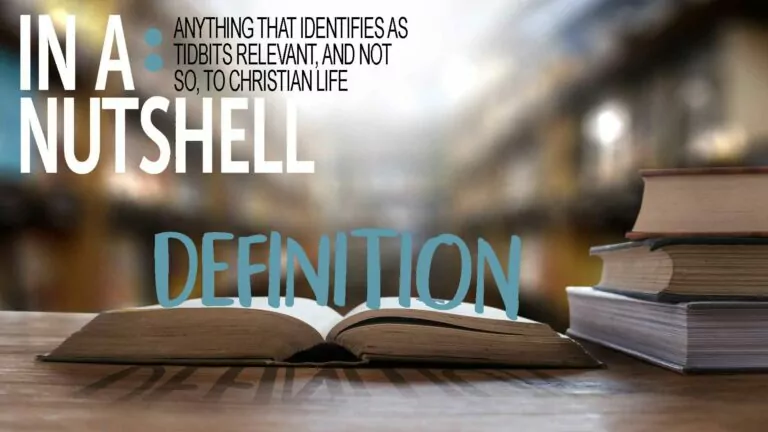The world’s only pro-life comedian?
Nicholas De Santo is an Iranian-Italian who performs what he calls the “only pro-life stand-up act” which, he notes, also means it is “the world’s funniest pro-life stand-up act.” Here’s a good bit from a set he did at London’s Backyard Comedy Club to a very receptive audience.
“So, in the US the Supreme Court overturned Roe v. Wade and that was a serious blow to casual dating and casual sex, but it was a major victory for babies who want to live so, that’s half full. And it was a major victory for Catholic biology. Do you guys know Catholic biology? I was born in Italy; I went to Catholic school. According to Progressive biology, they say “my body, my choice” because according to Progressive biology a woman, at some points in her life, she has a second beating heart, an extra pair of kidneys, and four extra limbs. But according to Catholic biology, a woman throughout her life has only one brain, one heart, and so forth so. In other words, if you are a woman and you ever find a second beating heart in your body, it’s not your body! And if you’re a man and you ever find a second beating heart in your body, it’s not your body…and also you are not a man.”
On the point of being open-minded
“My friend said that he opened his intellect as the sun opens the fans of a palm tree, opening for opening’s sake, opening infinitely for ever. But I said that I opened my intellect as I opened my mouth, in order to shut in again on something solid.”
– G.K. Chesterton
English: that weird and wonderful language
I’ve wondered if dad jokes might be a particularly or at least especially English thing. As a mishmash of so many other languages, there’s so much potential for wordplay. Here are just a few puns and ponderables:
- Before was was was, was was is.
- The word queue is just a Q followed by four silent letters
- Jail and prison mean the same thing, yet jailer and prisoner are opposites
- You have fingertips, not toetips, and yet you can tiptoe, not tipfinger
- How can wise man and wise guy be antonyms?
- We have players in a recital, and reciters in a play.
- Cough, rough, dough, bough, and through should rhyme but don’t.
- While you can drink a drink you can’t eat an eat or food a food.
- Your nose can run and your feet can smell!
Why English is so hard
They say Albert Einstein didn’t speak in full sentences until he was five. Maybe he just didn’t have anything to say, or perhaps learning English is hard enough to challenge even a genius. Just consider one small part of the process that, at first glance, might seem easy: creating plurals. Dog becomes dogs; cat becomes cats – it’s as easy as adding an S, right? Not so fast! Below is a part of a poem, credited only to Anonymous, that tackles the problem of plurals. This is just one verse, but there are many more plural problems where this came from!
If the plural of man is always called men,
Why shouldn’t the plural of pan be called pen?
If I speak of my foot and show you my feet,
And I give you a boot, would a pair be called beet?
If one is a tooth and a whole set are teeth,
Why shouldn’t the plural of booth be called beeth?
Why English is hard – part II
A native English speaker knows never to speak of a “red massive bull.” Instead, he’d describe it as a “massive red bull” …but he wouldn’t know why. That’s because there is a rather precise ordering of adjectives that we all mostly know, even though we don’t know that we know. While it isn’t absolutely fixed, the order of adjectives most English folk agree to goes roughly like this: quantity, opinion, size, age, shape, color, origin, material.
So, for example, we might ask for three Grade A eggs (quantity, opinion) but not Grade A three eggs. Or we’d talk about one hundred, enormous, old, round Englishmen (quantity, size, age, shape, origin) but not English, round, old, enormous, one hundred men.
This knowledge is a gift to you as a native speaker, but it’s quite the challenge for any latecomer to our country. So, the next time you hear your Dutch grandmother, or maybe some newer immigrant, talk a little peculiarly, you’ll know why (and you’ll be sure to cut them some slack).
How English is going to become easy
While our native tongue does sometimes tie us up, the next generation can look forward to a much-simplified version. I had my own ideas for streamlining things that involved doing away with the letter C completely, substituting K where it was a hard sound and substituting S everywhere else. Kan’t we all agree that’d be niser? I took the idea to Merriam Webster (the dictionary lady) and she asked what I was going to do with the C in CH and I kouldn’t kome up with mukh of an answer for her.
Anyways, Merriam did share with me her own simplification plans, giving me a peek at an upcoming edition of her dictionary. She’s managed to do what I could not – they’ve streamlined everything! She wasn’t sure exactly when this edition was coming out, but she knew it would be very soon. Here are a few entries from the first page:
a [ā] noun Anything that identifies as the letter A
Aaron [ae rihn] noun Anything that identifies as Aaron
ABBA [a ba] noun Anything that identifies as ABBA
asinine [as i nīn] adjective Anything that identifies as being asinine
Why today’s temperature?
Those that hold to a millions-of-years-old earth also hold that the earth has been both vastly warmer and enormously cooler during that time. So why then do the global warming proponents among them think that the temperature we have now is the one we must maintain?
This is an urgent question, as it is on the basis of today’s temperature being the right one that carbon taxes are being implemented, fossil fuels are being made more expensive, and consequently energy, and all that requires energy to produce (i.e., homes, food, heating, clothing, and, well, everything) more expensive as well. That’s even making things tough in Canada, but it’s that much worse for those around the world who have much less.
Equal pay laws hurt those they are supposed to help
There’s both a theological and practical objection to “equal pay for equal work” laws, no matter how well-intentioned they might be. The practical objection is laid out by Milton Friedman in the quote below:
“…the actual effect of requiring equal pay for equal work will be to harm women. If women’s skills are higher than men’s in a particular job and are recognized to be higher, the law does no good, because then they will be able to compete away and can get the same income. If their skills are less, for whatever reason…and you say the only way you are able to hire them is by paying the same wage, then you’re denying them the only weapon they have to fight with. If the unwillingness of the men to hire them is because the men are sexist pigs… nonetheless you want to make it costly to them to exercise their prejudice. If you say to them you have to pay the same wage no matter whether you hire women or men then here’s Mr. Sexist Pig: it doesn’t cost him anything to hire men instead of women. However, if the women are free to compete and to say ‘Well now, look, I’ll offer my work for less,’ then he can only hire men if he bears a cost. If the women are really good as a man, then he’s paying a price for discrimination. And what you are doing, not intentionally but by misunderstanding, when you try to get equal pay for equal work laws is reducing to zero the cost imposed on people who are discriminating for irrelevant reasons. And I would like to see a cost imposed!”
The theological objection is covered in the “Parable of the Workers in the Vineyard” (Matt. 20:1-16). While the parable is about grace, not economics, what it illustrates is true: “Don’t I have the right to do what I want with my own money? Or are you envious because I am generous?” If an employer wanted to pay the last worker more than the rest, but pays others what he agreed to, what business is the last worker’s wages to us? Or the first?
Mo Willems’ sage advice
Mo Willems, the author of the delightful Elephant and Piggie children’s book series, has some good advice for adults too. Here’s a trio:
- You only have one chance to make a twenty-third impression.
- Better to say, “I love you more than ever” than “I used to love you less.”
- Better to say, “You are one in a million” than “There are 7,960 others just like you out there.”
Some truths are simply written on our hearts
In a 1998 debate with atheist Peter Atkins in which Atkins touted science as the ultimate arbitrator of truth, William Lane Craig highlighted how there are fundamental truths that science can’t prove. Craig is a theistic evolutionist, but does well here.
“I think that there are a good number of things that cannot be scientifically proven, but that we’re all rational to accept. Let me list five.
“Logical and mathematical truths cannot be proven by science. Science presupposes logic and math so that to try to prove them by science would be arguing in a circle.
“Metaphysical truths like, there are other minds than my own, or that the external world is real, or that the past was not created five minutes ago with the appearance of age are rational beliefs that cannot be scientifically proven.
“Ethical beliefs about statements of value are not accessible by the scientific method. You can’t show by science that the Nazi scientists in the camps did anything evil as opposed to the scientists in Western democracies.
“Aesthetic judgments cannot be accessed by the scientific method because the beautiful, like the good, cannot be scientifically proven.
“And, most remarkably, would be science itself. Science cannot be justified by the scientific method, since it is permeated with unprovable assumptions.”
Just one issue?
“If you’re pro-life, you realize abortion is murder. How can you say ‘it’s one of many issues’ and vote for a pro-choice candidate? What policy of theirs could be so good that it’s worth allowing millions of babies to be killed?”
– Seamus Coughlin












